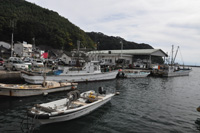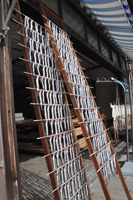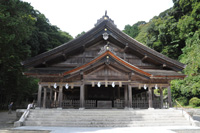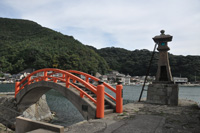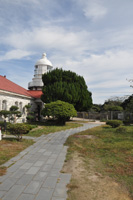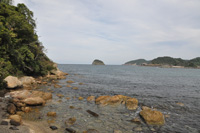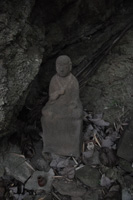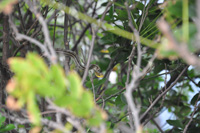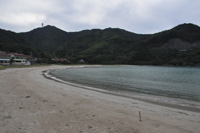 Mt. Daisen, a volcanic mountain which stands directly on the Sea of Japan in the Tottori Prefecture, was regarded as one of the most important mountains for Japanese Shugendo. According to the Izumo Kokudo Fudoki, completed in 733, this mountain was called Ōkami-take, literally, Mountain of the great god. It has an elevation of 1,729 meters. The Daisen volcanic belt is a part of the Southwest Honshū volcanic arc, where the Philippine Sea Plate is subducting under the Amurian Plate.
Mt. Daisen, a volcanic mountain which stands directly on the Sea of Japan in the Tottori Prefecture, was regarded as one of the most important mountains for Japanese Shugendo. According to the Izumo Kokudo Fudoki, completed in 733, this mountain was called Ōkami-take, literally, Mountain of the great god. It has an elevation of 1,729 meters. The Daisen volcanic belt is a part of the Southwest Honshū volcanic arc, where the Philippine Sea Plate is subducting under the Amurian Plate.
 Yonago is a city located in the northwest of Tottori Prefecture, facing the Sea of Japan, and adjacent to Shimane. It is the prefecture's second largest city after Tottori and therefore a commercial center of the western part of this prefecture. The current city was administratively founded on April 1, 1927, and merged with Yodoe Town in 2005. The name Yonago means "Rice Child", though since the city has begun to develop into a trade center of note, it has acquired the nickname Osaka in San-in. The Amago family, the daimyo in the Sengoku period, constructed a castle in the area. In the Edo period, the castle was kept by a castellan who served the Ikeda of Tottori. Yonago has always been an important crossing point of several routes in the area. Currently, it is the crosspoint of three railway lines and has a seaport to the Oki Islands.
Yonago is a city located in the northwest of Tottori Prefecture, facing the Sea of Japan, and adjacent to Shimane. It is the prefecture's second largest city after Tottori and therefore a commercial center of the western part of this prefecture. The current city was administratively founded on April 1, 1927, and merged with Yodoe Town in 2005. The name Yonago means "Rice Child", though since the city has begun to develop into a trade center of note, it has acquired the nickname Osaka in San-in. The Amago family, the daimyo in the Sengoku period, constructed a castle in the area. In the Edo period, the castle was kept by a castellan who served the Ikeda of Tottori. Yonago has always been an important crossing point of several routes in the area. Currently, it is the crosspoint of three railway lines and has a seaport to the Oki Islands.
I am going to eventually add the presentation of a new ministerial case at this point in the Japan Journal. It is clear that much of the theology section of my original Pastoral Paper, or what I am here calling a Ministerial Platform, is in need of update. I am also sensing that the original case upon which that theological reflection is based bears a striking similarity with a case that emerged from this portion of the trip.
 Back now to the task at hand. I'm on my way back to Tokyo for an overnight before heading out to Mt. Mitake, my last temple visit and last excursion.
Back now to the task at hand. I'm on my way back to Tokyo for an overnight before heading out to Mt. Mitake, my last temple visit and last excursion.
Today the train feels like the driver is alternately speeding up, coasting, and hitting the brakes. At this speed it's very uncomfortable. With laptop and headphones on I'm trying to get into the zone. I've already seen Osaka and Kyoto so I'm not paying much attention to what's flying by today.
 OK, I'm sad to see Kyoto for the last time. What a city of contradictions! Run-down post-war buildings interspersed with modern skyscrapers, both almost eclipsing the pagodas and temples of this once-capital.
OK, I'm sad to see Kyoto for the last time. What a city of contradictions! Run-down post-war buildings interspersed with modern skyscrapers, both almost eclipsing the pagodas and temples of this once-capital.
I wanted to say something more about mobility on my first Shinkansen ride, but it was too early to have any real thoughts. Even with negative political and economic changes this is a country on the move. It isn't this easy to move around in the US. It is not an exaggeration to say it's possible to move in a day from one end of the country to the other, or to move from one of the biggest cities on earth into alpine wilderness. I am embarassed not knowing any of the language, but even still it's easy to get around.
 This trip has been more of a pilgrimage than any vacation. It feels like it has eclipsed my trips to Italy or other significant vacations. I could place this excursion in the category of the best retreats I have made for increased awareness of God and myself, and specifically for the feeling of communion I have had with God. I have also had this feeling of communion with complete strangers: fellow pilgrims in Koya and Shigi, restaurant owners communicating through their cuisine, and through the fleeting eye contact or nod with people on the street. I have no immediate sense of the implications of this experience, but simply know that it is probably formative in significant ways. What I mean is that I hope that this feeling can continue! To have this experience of connection not just with strangers, but with humanity, would be a very good thing.
This trip has been more of a pilgrimage than any vacation. It feels like it has eclipsed my trips to Italy or other significant vacations. I could place this excursion in the category of the best retreats I have made for increased awareness of God and myself, and specifically for the feeling of communion I have had with God. I have also had this feeling of communion with complete strangers: fellow pilgrims in Koya and Shigi, restaurant owners communicating through their cuisine, and through the fleeting eye contact or nod with people on the street. I have no immediate sense of the implications of this experience, but simply know that it is probably formative in significant ways. What I mean is that I hope that this feeling can continue! To have this experience of connection not just with strangers, but with humanity, would be a very good thing.
I haven't said much about God up to this point, and I think that this is where that maybe can begin to happen. I'm rounding literal and figurative bends at these moments in the trip. An original goal of these reflections was to get around to talking about a concept of God, but I think that is impossible without some foundation or structure. If, as I've earlier recognized, theology is based on experience then perhaps I am providing the foundation myself. I'm comfortable with that now, where earlier in my life I always felt that what someone else said had to be the starting point of that conversation. Theology relies on method and is, in that sense, a scientific pursuit. If you cannot see it on these pages yet then just trust me when I say that I am following a method here. I don't want to embark on a presentation of my concept of God without that method being clear, and risking the perception that my concept of God comes simply from my isolated experience.
Fits and starts at 200kmph. I know people who drive cars like this. Halfway to Tokyo from Okayama in the time I've written this.
 To describe what I mean by mobility is to say that I am in pursuit of the infinite God. A Christian would say that God is first in pursuit of us. This is what I feel on these trains, what I feel as I move around the country. Being on the move has always been a spiritual experience for me. This is what I came here for: a vacation with God. Nothing against anyone I've met or seen along the way, but this is first a matter of me and him. Everyone else helps in real ways. As I think about returning home I am anticipating the reorientation to ministry and to all the people I regularly encounter. My journey in life finally feels like it might be hitting a stride. It's not without sadness or frustration, but despair is becoming a memory and hope is more of a reality.
To describe what I mean by mobility is to say that I am in pursuit of the infinite God. A Christian would say that God is first in pursuit of us. This is what I feel on these trains, what I feel as I move around the country. Being on the move has always been a spiritual experience for me. This is what I came here for: a vacation with God. Nothing against anyone I've met or seen along the way, but this is first a matter of me and him. Everyone else helps in real ways. As I think about returning home I am anticipating the reorientation to ministry and to all the people I regularly encounter. My journey in life finally feels like it might be hitting a stride. It's not without sadness or frustration, but despair is becoming a memory and hope is more of a reality.
Nagoya.
How can I describe the pursuit of a God who is more unknown than known, who if the concept or reality of personhood suggests that persons are the most perfect beings in nature, then God is a Person of Persons? Then I have to say that God is a person, and that in the most real sense of the term I seek a personal relationship with him. I am pursuing the infinite, I hope as best as I can at the moment. The best of the Catholic mystical tradition suggests, and what I like about buddhist traditions too, is the belief that we can experience the infinite. I wish that I had a better way to talk about this, but the moments of meditation in Koyasan, however physically painful, put me in contact with a more universal experience of belief in this possibility. I really don't know what kind of pray-ers the monks there are, nor did they know this about me, but in my time there we could tell that we were speaking a common shorthand language.
 I am beginning to think that the restlessness that people feel today, however lamentable, may be expressive of a new moment in human evolution. Restlessness can end in despair; my writing from Guest House gives clear evidence of that fact. Restlessness can also bring about progress. My time in Clarion gives evidence of how restlessness can bring about both. O happy fault?
I am beginning to think that the restlessness that people feel today, however lamentable, may be expressive of a new moment in human evolution. Restlessness can end in despair; my writing from Guest House gives clear evidence of that fact. Restlessness can also bring about progress. My time in Clarion gives evidence of how restlessness can bring about both. O happy fault?
Let me say differently that restlessness may be the characteristic of this human moment. Here we are at a time we cannot identify, a cusp that gives us little sense of the future. It is so perplexing of a time that even the so-called enlightened, in an attempt to offer some expression or barometer of the moment suggest that we have moved on from postmodernism. I suggest that the pain and uncertainty that humanity feels at this moment is a sign that we are only beginning to experience this new epoch. Maybe the feeling of discontent will get worse before it gets better.
If uncertainty causes us to get more in touch with what is infinite and unknown then let's go! If we fear the unknown or are not trusting in the validy of our belief then we need to address that. If we need to retool or recalibrate our theology (if we even truly believe that our doctrine can develop), then perhaps we need to focus less on conclusions and products and more on method. What is it that causes our grief? Do we maybe fear that the ways of God have changed?
 Mobility can also be an expression of superficiality. Constant movement can mask or repress what we don't want to admit: that we are growing and changing and needing to adjust. Our constant movement might pay lip service to the impulse to genuinely or organically grow. Development can be confused with the construction of an artifice built by work and gadgets (and, ok, here's the easy one: the pursuit of pleasure), without an appreciation for the development which is underlying what we are today calling human progress.
Mobility can also be an expression of superficiality. Constant movement can mask or repress what we don't want to admit: that we are growing and changing and needing to adjust. Our constant movement might pay lip service to the impulse to genuinely or organically grow. Development can be confused with the construction of an artifice built by work and gadgets (and, ok, here's the easy one: the pursuit of pleasure), without an appreciation for the development which is underlying what we are today calling human progress.
Zen promotes nothingness or the void as a value or creative principle, while many in Japan and the west sidestep this pursuit for superficiality or the abandonment of meaning. There is a strand of thought in psychedelic experience that suggests that those who use drugs are seeking a literal experience of heaven. This is a different sort of void. Perhaps I am speaking of modern day ziggurats, and suggesting the following by all of this: that fundamental adherence to doctrine, the lapse into relativism, and pursuit of euphoria are all an effort to take heaven by storm.
